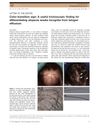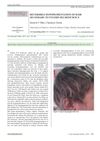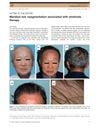 October 1890 in “Science”
October 1890 in “Science” Pilocarpin can cause hair regrowth and color change in some cases but not in others, and it may have side effects in animals.
 13 citations,
March 2020 in “Frontiers in cell and developmental biology”
13 citations,
March 2020 in “Frontiers in cell and developmental biology” A substance called TCQA could potentially darken hair by activating certain genes and increasing melanin.
 August 2024 in “Journal of the Korean Society of Cosmetology”
August 2024 in “Journal of the Korean Society of Cosmetology” Wild peach leaf extract improves hair strength, thickness, and shine after dyeing.
[object Object]  13 citations,
August 2019 in “Biological & Pharmaceutical Bulletin”
13 citations,
August 2019 in “Biological & Pharmaceutical Bulletin” Certain flavonoids help grow back colored hair after skin injury.
 2 citations,
January 2023 in “International journal of biological sciences”
2 citations,
January 2023 in “International journal of biological sciences” Gray hair can potentially be reversed, leading to new treatments.
 15 citations,
January 2019 in “International Journal of Women's Dermatology”
15 citations,
January 2019 in “International Journal of Women's Dermatology” Early treatment helps stop hair loss in women of color.
 6 citations,
September 2013 in “Advanced materials research”
6 citations,
September 2013 in “Advanced materials research” Non-ionic silicone emulsion best protects hair color from sunlight.
 12 citations,
September 2018 in “International Journal of Cosmetic Science”
12 citations,
September 2018 in “International Journal of Cosmetic Science” Palmitoyl tetrapeptide-20 may help reduce hair greying and increase melanin production.
 73 citations,
September 2003 in “Journal of Pharmacology and Experimental Therapeutics”
73 citations,
September 2003 in “Journal of Pharmacology and Experimental Therapeutics” Hair color loss can indicate the effectiveness of a drug targeting the KIT protein in mice and humans.
 53 citations,
November 1997 in “Journal of Forensic Sciences”
53 citations,
November 1997 in “Journal of Forensic Sciences” Darker hair in guinea pigs holds more codeine than lighter hair.
 2 citations,
March 2018 in “The Journal of Dermatology”
2 citations,
March 2018 in “The Journal of Dermatology” The "color-transition sign" helps tell apart alopecia areata incognita from telogen effluvium by looking at hair color changes.
 47 citations,
June 1996 in “International Journal of Legal Medicine”
47 citations,
June 1996 in “International Journal of Legal Medicine” Hair analysis for drugs needs a better understanding of how drugs enter hair, considering factors like hair structure and pigmentation.
[object Object]  41 citations,
December 2018 in “Experimental Dermatology”
41 citations,
December 2018 in “Experimental Dermatology” Understanding how melanocyte stem cells work could lead to new treatments for hair graying and skin pigmentation disorders.
 1 citations,
March 2019 in “Chinese Medical Journal”
1 citations,
March 2019 in “Chinese Medical Journal” Researchers identified potential markers for human hair color stem cells.
 September 2023 in “Scientific reports”
September 2023 in “Scientific reports” Segmental hair analysis can track testosterone over time but needs adjustments for sex, hair color, and washing frequency.
 July 2022 in “Research Square (Research Square)”
July 2022 in “Research Square (Research Square)” Hair analysis can somewhat track past testosterone levels but is influenced by factors like hair washing, growth rate, sex, and hair color.
 21 citations,
October 2014 in “Actas dermo-sifiliográficas/Actas dermo-sifiliográficas”
21 citations,
October 2014 in “Actas dermo-sifiliográficas/Actas dermo-sifiliográficas” Hair dyes can change hair color temporarily or permanently but may cause side effects like skin reactions and hair damage.
 6 citations,
January 2007 in “Actas dermo-sifiliográficas/Actas dermo-sifiliográficas”
6 citations,
January 2007 in “Actas dermo-sifiliográficas/Actas dermo-sifiliográficas” Gray hair regained color after thyroid hormone treatment.
 134 citations,
September 2008 in “Lasers in surgery and medicine”
134 citations,
September 2008 in “Lasers in surgery and medicine” Low fluence photoepilation temporarily removes hair by targeting the hair follicle's pigmented area without severe damage.
 1 citations,
January 2013 in “Nasza Dermatologia Online”
1 citations,
January 2013 in “Nasza Dermatologia Online” Vitamin B12 deficiency can cause reversible hair color loss in children.
11 citations,
April 2013 in “Homo” Darker skin in 10-year-old girls may be an early sign of puberty.
 9 citations,
July 2016 in “The Journal of Dermatology”
9 citations,
July 2016 in “The Journal of Dermatology” An 82-year-old man's white hair regained color after taking etretinate for psoriasis.
 28 citations,
December 2019 in “Skin appendage disorders”
28 citations,
December 2019 in “Skin appendage disorders” Some medications might reverse gray hair, especially those that reduce inflammation or stimulate pigment production, and vitamin B might help.
 5 citations,
June 2013 in “Fashion business”
5 citations,
June 2013 in “Fashion business” Rosehip extract improves hair wave, thickness, and color vibrancy.
1 citations,
October 2023 in “PloS one” Cosmetic hair treatments can increase hair testosterone levels, while natural hair color does not affect it.
 2 citations,
November 1995 in “American Journal of Obstetrics and Gynecology”
2 citations,
November 1995 in “American Journal of Obstetrics and Gynecology” Taking vitamin B6 corrected a pregnant woman's metabolic disorder, which changed her hair color.
 July 2018 in “Elsevier eBooks”
July 2018 in “Elsevier eBooks” Some drugs can cause reversible hair loss, but certain chemotherapy drugs may lead to permanent hair loss; drugs can also change hair color and texture.
 40 citations,
August 2006 in “Current Drug Safety”
40 citations,
August 2006 in “Current Drug Safety” Some drugs can cause hair loss, excessive growth, or color changes, often reversible but sometimes permanent.
 70 citations,
June 2010 in “Clinics in Dermatology”
70 citations,
June 2010 in “Clinics in Dermatology” Certain groups may need vitamin supplements to improve hair health and prevent other health problems.
 67 citations,
October 1997 in “Dermatologic Surgery”
67 citations,
October 1997 in “Dermatologic Surgery” The EpiLight Hair Removal System removed about 60% of hair with some side effects, and more research is needed to confirm long-term effectiveness.




























